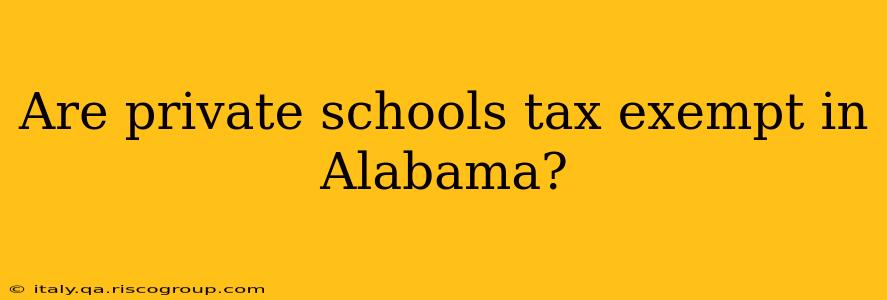The question of whether private schools in Alabama are tax-exempt isn't a simple yes or no. The answer hinges on several factors, primarily the school's specific organizational structure and its adherence to IRS guidelines for tax-exempt status under section 501(c)(3). Let's delve into the nuances of private school taxation in Alabama.
Understanding 501(c)(3) Status
To be tax-exempt in the United States, including Alabama, private schools generally must qualify under section 501(c)(3) of the Internal Revenue Code. This designation signifies that the school is a public charity operating for religious, educational, or other charitable purposes. Crucially, this status doesn't automatically grant exemption from all taxes. It primarily relates to federal income tax exemption.
Key Requirements for 501(c)(3) Status:
- Public benefit: The school must demonstrably serve a public interest, not just the private interests of its shareholders or founders. This includes offering educational services available to a broad segment of the population, not just a select few.
- Non-profit status: The school cannot distribute profits to its founders, owners, or members. Any surplus funds must be reinvested in the school's mission.
- Political neutrality: The school cannot engage in political campaigns or lobbying activities.
- Compliance with IRS regulations: The school must meticulously maintain records and file the appropriate paperwork with the IRS to retain its tax-exempt status.
State Taxes and Private Schools in Alabama
While 501(c)(3) status offers federal income tax exemption, it doesn't automatically translate to exemptions from all state and local taxes in Alabama. The state may levy taxes on property owned by the school, sales taxes on purchases, and other applicable taxes depending on the specific nature of the transaction.
Property Taxes: A Significant Consideration
Property taxes are a major point of contention for many private schools. While some private schools may qualify for property tax exemptions under specific Alabama state laws, this is not guaranteed. The eligibility hinges on factors such as the school's adherence to state requirements and the local tax assessor's assessment. Each county in Alabama may have its own regulations regarding property tax exemptions. Therefore, it's crucial to check with the local county tax assessor's office for specific details.
Navigating the Legal Landscape
The tax implications for private schools in Alabama are complex and often require professional guidance. It's advisable for any private school in Alabama to:
- Seek legal and accounting counsel: Consult with tax professionals experienced in navigating the intricacies of 501(c)(3) status and Alabama's tax code.
- Maintain meticulous records: Accurate and detailed record-keeping is essential for demonstrating compliance with both federal and state tax regulations.
- Stay updated on tax law changes: Tax laws evolve, so staying informed about changes is vital for maintaining tax-exempt status.
Conclusion: No Simple Answer
The question of tax exemption for private schools in Alabama doesn't have a straightforward answer. While many private schools aim for and achieve federal 501(c)(3) status, this doesn't guarantee exemption from all state and local taxes. The level of tax exemption depends greatly on the school's specific circumstances and adherence to both federal and state regulations. Professional advice is highly recommended for any private school in Alabama seeking clarification on its tax obligations.

